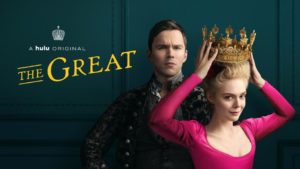TV Review: Fine Shades of Humanism in Hulu’s The Great

The story of a young Catherine the Great comes to life with a heavy dose of creative liberty in Tony McNamara’s The Great, a ten-episode series that premiered on Hulu in May. The comedy-drama is aesthetically beautiful and full of intrigue, humor, and fantastic characters.
A little background on the historical figures: Catherine the Great was born Princess Sophie of Anhalt-Zerbst in 1729, daughter of a minor German royal and a military leader. As Peter III explains in the show’s first episode, Catherine was chosen as his bride because of her family’s noble roots, but also because their poverty and social irrelevance rendered them unthreatening to his crown. In real life, Catherine arrived in Russia during the reign of Peter’s aunt Empress Elizabeth, who ruled for nearly two decades. In The Great, Peter is the son of Peter the Great, and already emperor by the time he marries Catherine.
Played by Elle Fanning, Catherine is unfailingly upbeat, hopeful, and excited about her marriage to the Russian emperor. Their first meeting reveals the fundamental clash between their characters: Catherine is gracious and humble; Peter, played by Nicholas Hoult, is brash, sarcastic, and flippant. When Catherine offers Peter a symbolic tree branch to represent the beginning of their lives together, he questions his aides whether she is just “another inbred.” Clearly, the symbolism of a tiny branch growing into a mighty tree is lost on him.
This type of exchange is common throughout the show: Catherine is educated, curious, and thoughtful, while her husband is content to chug vodka, sleep around, and humiliate his subordinates like an overgrown toddler.
After the first few episodes, the show’s true plot is revealed: Catherine will attempt a coup against her husband and take the throne for herself. Spurred on by her aristocrat-turned-servant maid Marial (Phoebe Fox), Catherine begins to target disillusioned members of Peter’s inner circle to join her in the coup. She snags Count Orlo (Sacha Dhawan), who’s tired of Peter’s sadism and idiocy, and with whom she bonds over Voltaire and a shared intellectual curiosity.
One of the series’ strengths is its ability to avoid flat characters. Catherine is brilliant, but she makes tactical mistakes; Peter is a cruel, childish fool, but he’s surprisingly perceptive. The show is a drawn-out cat-and-mouse game, with Catherine and Peter each preempting and outsmarting the other under the thin veneer of a loving marriage. Most interesting is how the show explores Catherine and Peter’s reasons for ruling: Catherine hopes to enlighten Russia to science, arts, culture, and education, while Peter has no such moral philosophy and believes his power comes from God.
The Great is abundant with humanist themes. There are the overt humanist elements—the Enlightenment backdrop, Catherine and Peter’s clashes over progressive ideas, and Catherine’s mostly ill-fated attempts to bring culture and education to the court. There’s also the humanist tone of the show in general, which treats all of its subjects as complex, emotional, fallible human beings. Every character—the snobbish ladies of the court, Peter’s bumbling minister of war, Catherine’s servant boy—has an interesting backstory and real significance to the plot.
Peter himself is the anti-humanist. He places so little value on human life that he wages war for fun or petty revenge. At every turn, he forces his inner circle—made up of counts, military leaders, and aristocrats—to dance for him, laugh at his inane jokes, or act as his punching bag. When Catherine secures funding to build a girls’ school and excitedly plans her curriculum, Peter burns the schoolhouse down. He forces his best friend to “loan” him his wife as a mistress. His idea of modernization is enforcing a “no beards” policy for nobles. He’s more Henry VIII than Peter the Great.
However, in an example of the show’s dynamic characterization, Peter actually invites Voltaire to his court as a gift to Catherine, who is unsurprisingly ecstatic to meet with her idol. This uncharacteristically kind gesture is a testament to the humanist view that people are both complex and capable of goodness and real personal growth. And while several moments in the show make the viewer reconsider Peter’s awfulness, his occasional kindness to his wife doesn’t override his cruelty towards his courtiers, and most of all, his subjects.
Still, the creators take a humanistic approach to why Peter is so awful, and give him a complex (if comedic) backstory. A recurring element is Peter’s bizarre obsession with his dead mother, whose corpse he keeps encased in a glass display in his palace. We learn that Peter’s mother was cold, disapproving, and uncomfortable with Peter’s idolization of her. He tells Catherine that “someone should work out what goes on between a chap and his mother, there’d be money in that,” in one of the best lines in the series. Peter is also figuratively and literally overshadowed by his beloved father, Peter the Great, whose statue—and legacy—loom large in court.
The creators’ attitude towards religion is also distinctly humanistic. The yoke of Russian Orthodoxy is personified in the Archbishop known as Archie (Adam Godley), whose extreme (sometimes sincere, sometimes not) religiosity and conservatism put him at frequent odds with Catherine and Count Orlo. When Archie advises Peter in matters of state, he purports his wisdom to be directly from God—making it impossible for the court’s liberals to argue against him. But, to the show’s advantage, Archie isn’t a carbon copy of Victor Hugo’s Frollo. He displays genuine devotion to his faith but also empathy, particularly towards his relatives.
By the end of the series, we’re stuck in a moment of chaos, unsure if Catherine will successfully usurp the throne as she did in history. But with a second season on the way, we’re sure to find out. As a humanist, The Great gave me plenty to contemplate.
